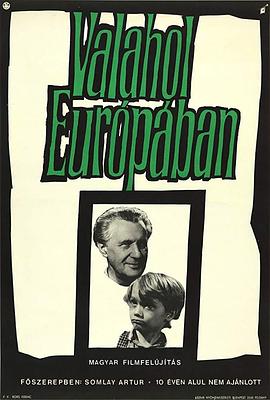简介
Somewhere in the remote region, the war ends. In the midst of ruined cities and houses in the streets, in rural hamlets, everywhere where people still live, are children who have lost their homes and parents. Abandoned, hungry, and in rags, defenseless and humiliated, they wander through the world. Hunger drives them. Little streams of orphans merge into a river which rushes forward and submerges everything in its path. The children do not know any feeling; they know only the world of their enemies. They fight, steal, struggle for a mouthful of food, and violence is merely a means to get it. A gang led by Cahoun finds a refuge in an abandoned castle and encounters an old composer who has voluntarily retired into solitude from a world of hatred, treason, and crime. How can they find a common ground, how can they become mutual friends The castle becomes their hiding place but possibly it will also be their first home which they may organize and must defend. But even for this, the price will be very high. To this simple story, the journalist, writer, poet, scriptwriter, movie director, and film theoretician Béla Balázs applied many years of experience. He and the director Géza Radványi created a work which opened a new postwar chapter in Hungarian film. Surprisingly, this film has not lost any of its impact over the years, especially on a profound philosophical level. That is to say, it is not merely a movie about war; it is not important in what location and in what period of time it takes place. It is a story outside of time about the joyless fate of children who pay dearly for the cruel war games of adults. At the time it was premiered, the movie was enthusiastically received by the critics. The main roles were taken by streetwise boys of a children's group who created their roles improvisationally in close contact with a few professional actors, and in the children's acting their own fresh experience of war's turmoil appears to be reflected. At the same time, their performance fits admirably into the mosaic of a very complex movie language. Balázs's influence revealed itself, above all, in the introductory sequences an air raid on an amusement park, seen in a montage of dramatic situations evoking the last spasms of war, where, undoubtedly, we discern the influence of classical Soviet cinematography. Shooting, the boy's escape, the locomotive's wheels, the shadows of soldiers with submachine guns, the sound of a whistle—the images are linked together in abrupt sequences in which varying shots and expressive sharp sounds are emphasized. A perfectly planned screenplay avoided all elements of sentimentality, time-worn stereotypes of wronged children, romanticism and cheap simplification. The authors succeeded in bridging the perilous dramatic abyss of the metamorphosis of a children's community. Their telling of the story (the scene of pillaging, the assault on the castle, etc) independently introduced some neorealist elements which, at that time, were being propagated in Italy by De Sica, Rossellini, and other film artists. The rebukes of contemporary critics, who called attention to formalism for its own sake have been forgotten. The masterly art of cameraman Barnabás Hegyi gives vitality to the poetic images. His angle shots of the children, his composition of scenes in the castle interior, are a living document of the times, and underline the atmosphere and the characters of the protagonists. The success of the picture was also enhanced by the musical art of composer Dénes Buday who, in tense situations, inserted the theme of the Marseilaise into the movie's structure, as a motive of community unification, as an expression of friendship and the possibility of understanding. Valahol Europaban is the first significant postwar Hungarian film. It originated in a relaxed atmosphere, replete with joy and euphoria, and it includes these elements in order to demonstrate the strength of humanism, tolerance, and friendship. It represents a general condemnation of war anywhere in the world, in any form.
猜你喜欢
-
HD
Zamachnapapieza
主演:卡罗利娜·格鲁什卡,博古斯瓦夫·林达,伊雷纽什·乔普 -
HD国语
铁肩
主演:孙铁,时晓飞 -
HD
真理与背叛
主演:伊万·霍罗克斯,鲁珀特·伊文斯,费迪南德·麦凯,Daf,Thomas,Nye,Occomore,乔安娜,克里斯蒂,肖恩·马洪,Sylvie,Varcoe,本·迪洛韦,丹尼尔·贝茨,Celinde,Schoenmaker,Aaron,Zicman,Gwenver,Farnworth,克里斯托斯·劳顿,多米尼克·马夫海姆,Gabriel,Scott,John,Sackville,Maxim,Ays,Sam,Pamphilon,布莱恩·卡斯佩 -
HD
清算
主演:高捷,姜皓文,侯桐江,湛佳明 Jiaming Zhan,张荣祥 Cheung Wing-Cheung,屈刚,张媛钰,贾天明,景乐,韩则怡 Zeyi Han,武岳 Yue Wu,张怀公,洪子龙 Zilong Hong,刘浩岚 Haolan Liu,刘开心 Kaixin Liu -
HD
父亲
主演:米兰·翁德拉克,Dominika Moravkova,安娜·盖伊斯洛娃 -
HD国语
怪兽岛
主演:张智豪 -
洛桑的家事
主演:金巴,扎西,加华草,更旦,居琼钦 -
HD
昨日青春
主演:栗原飒人,日高由起刀,林裕太,彭泽萱,祷云母,阿拉季,佐野史郎,渡边真起子,中岛步,普希姆 -
HD
主谋
主演:乔什·奥康纳,阿拉娜·哈伊姆,盖比·霍夫曼,约翰·马加罗,比尔·坎普,霍普·戴维斯,莱齐·费利兹,马修·马希尔,科尔·杜曼,玛戈特·安德森-宋,伊莱·盖布,胡安·卡洛斯·赫尔南德斯,让·扎尔祖尔,瑞安·霍姆奇克,威尔逊·康克赖特,凯蒂·哈伯德,史蒂文·特里·沃克,D·J·斯特劳德,格雷格·维奥兰德,安吉尔·科恩斯 -
HD
索蕾:来自未来的妻子
主演:希拉·达拉·艾莎,迪翁·维约科,David Gojkovic -
HD
弗拉明戈的神秘眼神
主演:Tamara Cortes,马迪亚斯·卡塔兰,Paula Dinamarca,Pedro Mu?oz,路易斯·杜博,Vicente Caballero,Bruna Ramírez,Sirena González,Alexa Quijano,Francisco Día Z,Claudia Cabezas -
HD
轻声告诉我
主演:费尔南多·林德斯,安德斯·维伦科索,帕特里夏·维柯,西莉亚·费杰罗,Fernando Nagore,艾丽西娅·法尔科,Eve Ryan,Diego Vidales

